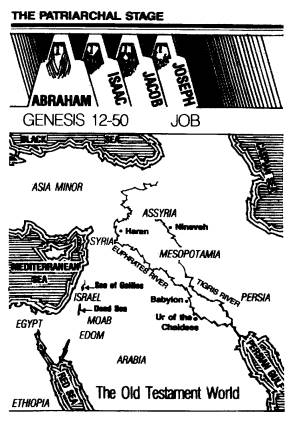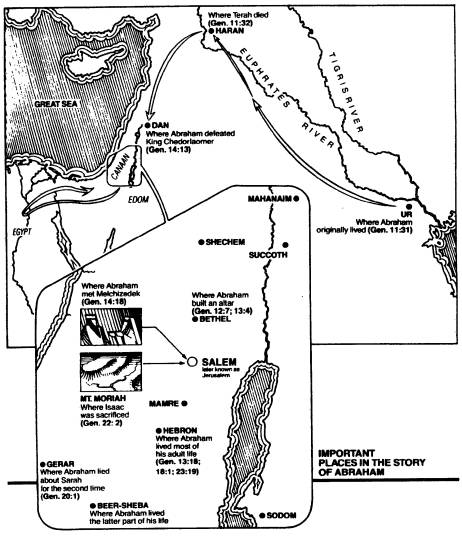The
Book of Genesis
Chapter Twelve
The Calling of Abraham
Lesson Verse: Acts 7:2
I.
Lesson Introduction
A. We now enter THE PATIRLARCHAL STAGE (Genesis 12‑50; Job)
1. The important men who appear during this stage are Abraham, Isaac, Jacob, Joseph, and Job. Abraham is considered to be the second of the seven greatest men who ever lived. These are: Adam, Abraham, Moses, David, John the Baptist, Peter, and Paul.
2. In the Creation Stage, God dealt with the entire earth in general. For example, Genesis 1 ‑ 11 deals with the world of men as a whole. Now, however, in the Patriarchal Stage, he will employ the rifle instead of the shotgun. The floodlight will give way to the spotlight. Our attention is now drawn from the world to a nation (Israel), then to a tribe in that nation (Judah), then to a family within that tribe (Jesse), and finally to an individual within the family (Jesus Christ).
3. This stage spans a period of some 350 years.
a) Here a city is destroyed on the plains (Sodom) and a boy is spared on a mountain (Isaac) (Gen. 19, 22).
b) Here a son (Jacob) deceives his Father (Isaac) and is later himself deceived by his sons (brothers of Joseph) (Gen. 27, 37).
c) Here we read of the first barren wife (Sarah) and the first dying mother (Rachel) (Gen. 16, 35).
d) This stage records how Gods friend (Abraham) speaks to him concerning a city (Sodom), and how his enemy (Satan) speaks to him concerning a saint (Job) (Gen. 18; Job 1‑2).
NOTE: The story in the book of Job is thought by some scholars to have taken place at the same time that Moses saw the burning bush in Exodus 3. This would have made Job one of the Patriarchs to be considered in this study, and you will note an occasional mention of Job. Others feel it is the most ancient book in the Bible, being written before Moses wrote the Pentateuch. These would place Job as a contemporary of Abraham. The book contains no reference to the events of Exodus. It gives a valuable picture of patriarchal life outside the "promised land".
e) Jerusalem (a type of the heavenly) and Egypt (a type of the worldly) are first mentioned in this stage (Gen. 13‑14).
f) Here we first learn of a king called Melchizedek and a cave named Machpelah (Gen. 14, 25).
g) Here the first of three great biblical covenants is introduced.
1) The Abrahamic Covenant, promising a goodly land (Gen. 15).
2) The Davidic Covenant, promising a glorious king (2 Sam. 7).
3) The new covenant, promising a godly people (Jer. 3 1).
B. The remaining thirty‑nine chapters of Genesis (12‑50) summarize the lives of Abraham, Isaac, Jacob, and Joseph.
C. Although there is some overlapping, the following chapter division may be noted:
1. Genesis 12 ‑ 24 ‑ The story of Abraham
2. Genesis 24 ‑ 27 ‑ The story of Isaac
3. Genesis 28 ‑ 36 ‑ The story of Jacob
4. Genesis 37 ‑ 50 ‑ The story of Joseph

II.
Lesson - ABRAHAM (GEN. 12 ‑ 24).
A. His Conversion
1. Abraham was born around 2166 b.c. We know nothing of his early life or how he was led to God. It has been speculated that either Job, Shem, or even Melchizedek showed him the way of salvation. The importance of his life cannot be underestimated. He is mentioned some 308 times in the Bible; 234 times in the Old Testament; and 74 in the New Testament. Abraham was the reason the southern kingdom was spared as long as it was. (See 2 Kgs 13:23)
a) The book of Genesis spans a period of around 2,350 years.
b) The First eleven chapters, which describe the Creation of the universe, the Fall, Flood, and Tower of Babel, cover a period of 2000 years.
c) The last thirty‑nine chapters concern themselves with Abraham and his seed, covering some 350 years.
d) In other words, God gave us more detail about Abraham than about the origin of the universe!
2. Abraham was horn and raised in the city of Ur of the Chaldees. Ur was a seaport on the Persian Gulf, at the mouth of the Euphrates River, some twelve miles from the traditional site of the Garden of Eden. But preceding the time of Abraham, it was the most magnificent city in all the world; a centre of manufacturing, farming, and shipping, in a land of fabulous fertility and wealth, with caravans going in every direction to distant lands, and ships sailing from the docks of Ur down the Persian Gulf with cargoes of copper and hard stone. For years the skeptic ridiculed the actual existence of Ur. But during the years of 1922‑1934 C. T. Wooley of the British museum thoroughly explored the secrets of these ruins. The most conspicuous building of the city in Abraham's day was the ziggurat, or the temple tower, which was probably patterned after the Tower of Babel. This tower was square, terraced, and built of solid ‑brick. Each successive terrace was planted with trees and shrubbery. The city had two main temples, one dedicated to Nannar, the Moon‑god, and the other to his wife, Ningal. (The information concerning Ur was gleaned in part from Halley's Handbook, pp. 88, 89)
B. His Calling (Gen. 11: 3 1; 12: 1 Josh. 24:3; Acts 7:2).
1. He was to leave Ur and his father's house for a land that God would show him.
2. God’s call has always been, “to separate”
a) Marriage (Gen 2:24)
b) Salvation
c) Holiness (2Cor 6:14-18)
C. His Caution (11:31, 32).
1. God had told Abraham to leave his father's house and proceed to Canaan. But he was disobedient concerning both matters in that he took his father with him, and allowed himself to get bogged down in Haran. Haran was the last green outpost of civilization before one entered the vast desert of Arabia. The city was 700 miles north‑west of Ur and about sixty miles from the Euphrates River. It was located on a main caravan road connecting the cities of the east with Damascus and Egypt. This was considered a strategic location. The city also worshipped the moon god and goddess as did Ur. Abram might have been content to settle in Haran permanently, but once more God stepped in and Terah his father died. After that, Abram quickly moves on! The name "Terah" means "delay." Only God knows the multitudes of Christians that have left Ur, bound for Canaan, only to get bogged down in Haran.
D. His Commission (Gen. 12:2,3; Acts 7:3) was sevenfold:
1. I will make of thee a great nation.
2. I will bless thee.
3. I will make thy name great.
4. Thou shalt be a blessing.
5. I will bless them that bless thee.
6. I will curse him that curseth thee. (See the book of Esther.)
7. In thee shall all families of the earth be blessed. (A reference to Christ; see Mt. 1:1.)
E. His Canaan (12:4‑9). This is where Abram works his faith – puts it into action
1. He entered the Promised Land and pitched camp near Shechem. some thirty miles north of Jerusalem.
2. God again appeared to him.
3. It should be noted that the Lord had simply promised to show him a land when he was in Ur, but now adds the words, "Unto thy seed will I give this land." (Compare 12:1 with 12:7)
4. Abram built his first recorded altar here.
5. He then moved on to Bethel, a place meaning "house of God" which would later become a very sacred place in Canaan. (See Gen. 28:1‑22; 35:7).
6. At Bethel he built his second altar to the Lord.
F. His Carnality (12:10‑20).
1. After a short while, the land was hit with famine. Thus far, he had obeyed God and was dwelling victoriously in the Promised Land. But now comes the temptation from Satan. There was a famine in the land.
2. He then left Palestine and went to Egypt.
a) This is the first mention of Egypt in the Bible.
b) Egypt in the Scriptures is pictured as a symbol or type of the world, an instance of dependence upon some human source or help apart from God. As God himself once warned: "Woe to them that go down to Egypt for help ... but ... look not unto the Holy One of Israel, neither seek the Lord" (Isa. 31:1).
3. Pharaoh planned to marry Sarai, but was plagued by God and eventually found out the deception of Abraham. The angry king rightfully took Abram to task for this. After a frustrating, dangerous, and embarrassing time, Abram returned to Palestine, where he should have stayed in the first place. Notice the tragic results of his disobedience:
a) He grieved God ‑ Abram's sin (and our sin) always grieves God. (See Ps. 78:40; Eph. 4:30; Ps. 95: 10; Mk. 3:5.)
b) He weakened his own faith ‑ later Abram failed God in this same matter of lying about his wife. (See Gen. 20.) After we once commit a sin, the second time becomes much easier.
c) He became a poor testimony to his nephew Lot ‑some of Abram's worldliness rubbed off on Lot, with tragic results. (See Gen. 13, 19.)
d) He caused the Pharaoh to be afflicted. (See 12:17.) Sometimes the children of the world suffer for the sins of Christians. We note Pharaoh's rebuke to Abram here. There is no sadder situation in the world than when an unbeliever rebukes a Christian for some wrong action.
e) He picks up Hagar the Egyptian handmaid (Gen. 16:3). Hagar would later become Abram's mistress and would give birth to Ishmael, the father of the modern Arabs. Thus the agony of the world's most troubled hot spot, the Middle East, has been caused in part by Abram’s sin some thirty‑nine centuries ago.
f) He provided a bad example for his son, Isaac. Even though unborn at the time of the sin, Isaac doubtless was told of it as a young man; he failed God likewise by lying about his wife Rebekah. (See Gen. 26.) Lest we forget ‑ our sins always affect others.

III.
Conclusion
IV.
Study Questions